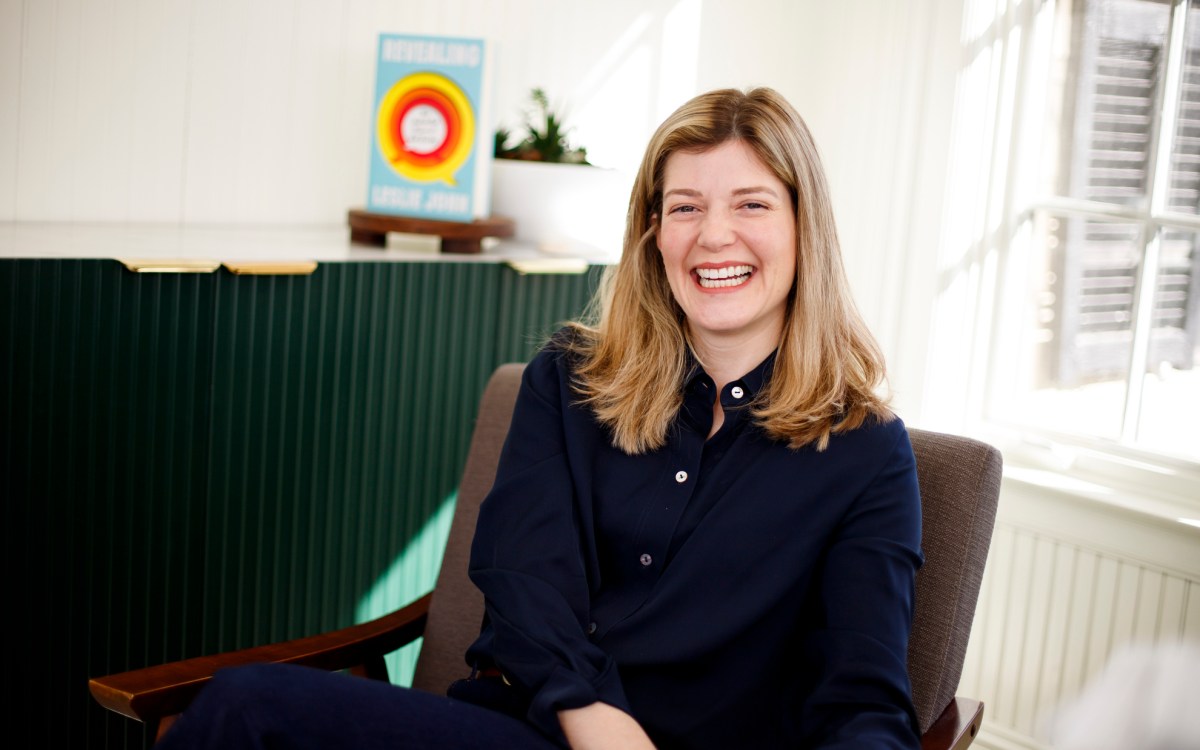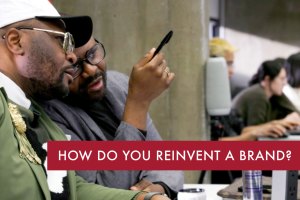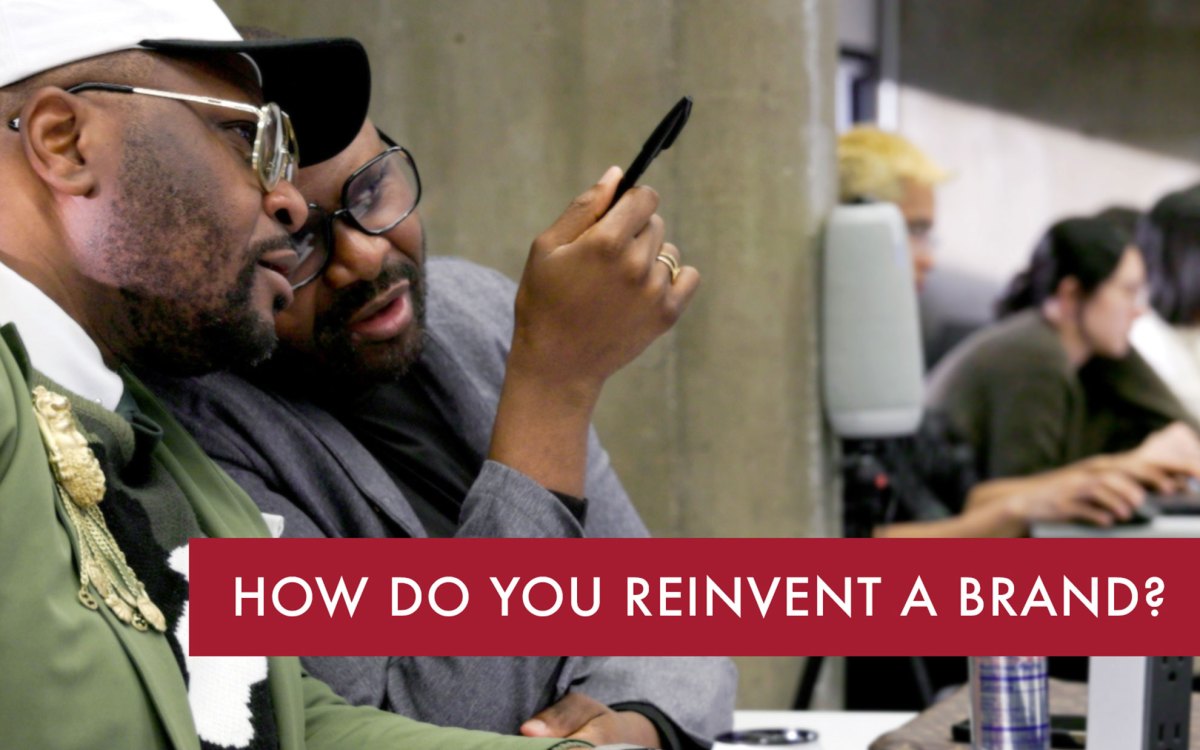
Illustration by Stuart Kinlough/Ikon Images
‘Harvard Thinking’: What skeptics get wrong about liberal arts
In podcast episode, an economist, an educator, and a philosopher make the case it’s as essential as ever in today’s job market
What is the point of college? It’s a question that many families and potential students think about when it comes to deciding the role of higher education in the future. This question is particularly pressing for those considering a liberal arts education.
“Why should some young person waking up to the world in late adolescence subject themselves to an education of four years or so that expects them to study a range of topics?” asked Susanna Siegel, the Edgar Pierce Professor of Philosophy, in this episode of “Harvard Thinking.” One reason is that it prepares future generations to think for themselves and contribute to a democratic society.
But it’s not just about critical thinking. David Deming, the Isabelle and Scott Black Professor of Political Economy who co-leads the College-to-Jobs Initiative at the Kennedy School, said it also sets students up for success in a constantly evolving workplace.
“Precisely because it is general, when it’s well-executed, [a liberal arts education] is teaching you not a set of specific competencies in some specific thing, but rather giving you a set of tools to teach you how to think about the next problem over the horizon,” Deming said.
Nancy Hill, the Charles Bigelow Professor of Education and a Developmental Psychologist in the Harvard Graduate School of Education, agrees that the liberal arts can enhance a student’s learning. However, she’s also seen how it can be perceived as a luxury education rather than the standard. Universities and other institutions should work to make this type of education more accessible.
“There isn’t a sense of freedom to explore a liberal arts education when people are concerned about the economy,” Hill said. “For people who are first-gen and people from low-income backgrounds, I want them to come into any college … and feel confident in taking courses that broadly expose them to ideas.”
In this episode, host Samantha Laine Perfas talks with Siegel, Deming, and Hill about why a liberal arts education matters — and how to make it attractive again.
Transcript
Nancy Hill: I think we haven’t made the liberal arts education attractive and innovated to make it attractive to people who are doing college in ways that we sometimes forget that that’s the majority of the ways in which people get their four-year degree. It’s overtime, it’s at night, it’s part-time. It’s almost as if the liberal arts education they’re experiencing is a luxury good, and we’re seeing it as an essential aspect of education.
Samantha Laine Perfas: The cost of college tuition is on the rise. Even with ramped-up financial aid efforts from universities, parents and students are still trying to decide whether or not tuition will lead to a smart return on their investment. Jobs increasingly require specific training or skill sets, leading some to question the value of a liberal arts education. Including fields like history, literature, and philosophy, the liberal arts have experienced diminishing enrollment numbers and institutions are trying to figure out their place in universities’ overall ecosystems.
So how do these institutions make a liberal arts education attractive again?
Welcome to Harvard Thinking, a podcast where the life of the mind meets everyday life. Today I’m joined by:
David Deming: David Deming, I am the Isabelle and Scott Black Professor of Political Economy at Harvard.
Laine Perfas: He studies education, inequality, and the future of work, and co-leads the College-to-Jobs Initiative at the Kennedy School. Then:
Hill: Nancy Hill, and I’m the Charles Bigelow Professor of Education and a developmental psychologist in the Harvard Graduate School of Education.
Laine Perfas: Nancy’s research focuses on parenting and adolescent development. And finally:
Susanna Siegel: Susanna Siegel. I’m the Edgar Pierce Professor of Philosophy in the Philosophy Department at Harvard.
Laine Perfas: She’s written a lot about perception, drawing on both philosophy and the sciences of the mind.
And I’m Samantha Laine Perfas, your host and a writer for the Harvard Gazette. Today, we’ll be taking a critical look at liberal arts education.
I think it’s important to start with, one, what is a liberal arts education and, two, how is it different than other types of higher education?
Siegel: Sometimes when people ask about what a liberal arts education is, and why it’s valuable, you can hear it as a kind of veiled or indirect way of asking what the values of the humanities are, because nobody asks, like, oh gosh, what’s the point of studying STEM fields? But I think there’s another way of hearing the question, which is not so much focused on the humanities, but a different question of like, why should some young person waking up to the world in late adolescence subject themselves to an education of four years or so that expects them to study a range of topics, to expose themselves to a range of different subjects and modes of thought, even while ultimately concentrating on one or two more than others? What’s the value of that plurality? My answer is I take very seriously the relationship between liberalism and liberal arts. I think that W.E.B. Du Bois said in his debate with Booker T. Washington, you know, education is a training for democratic citizenship and one thing we would lose if we lost liberal arts education is we’d become far more susceptible to politics of domination, to systems of governance that really rely on a very tight control over the horizon of ideas.
Hill: I would add to that, because I think when we think about a liberal arts education and when people get into the discourse of the value of a liberal arts education, people think about the price tag, and I think if we lost the liberal arts education, I agree with Susanna, we would lose some of the richness of what it means to live in a civil society, to think about culture, to think about innovation. If we think about colleges as training for vocation, and many people do want a return on investment of their college tuition, particularly as we’re seeing college tuitions raised at such an astronomical rate, people do want to know, what am I getting for it? And I think part of what we are losing as we think about the liberal arts education is really helping people understand its true value; that it might not be able to translate immediately to a job the way some undergraduate majors do, but we haven’t done a good job of saying, what value does it add to the kinds of careers that you might want? We’ve long since passed the stage where people start a job and stay in that job and work their way up and retire with the gold watch. We have to really think about preparing young people and preparing a workforce to really navigate a very creative and innovative career where they’re needed to reinvent themselves in relation to society, their interests, and their goals. And I think a liberal arts education provides that kind of intellectual flexibility and cognitive flexibility that society really needs.
Deming: Since I’m an economist, maybe I should craft an economic argument for what a liberal arts education does for people and how it differs from, let’s say more vocationally oriented training. So like why, if you want to be in finance, why not just major in finance and take a bunch of courses in finance? And the reason, which is something related to what Nancy said, is that people typically go to school at the very beginning of their lives and then whatever they learn has to last them for the next 40 to 50, God willing, years of life. And so the question is, what kind of education will prepare you not just for your first job, but for the rest of your life? The argument for a liberal arts education is the argument that precisely because it is general, when it’s well-executed, it is teaching you not a set of specific competencies in some specific thing, but rather giving you a set of tools to teach you how to think about the next problem over the horizon that we don’t have an answer to now because it hasn’t come around yet. And so that involves the ability to think critically. If someone’s telling me something, how likely is it to be true? What is their motivation? How much should I trust this source of information? How much should I think about somebody’s incentives to tell me the truth or not tell me the truth and how should I weigh evidence when perspectives are competing? Those are all things that are not really vocations. They’re really teaching you how to weigh evidence and how to think critically about other people’s perspectives and to adopt other people’s perspectives. And that’s a kind of teaching you how to think, teaching you how to learn tool kit that I think when done well, liberal arts education can do better than much more specific training for a specific job.
Hill: Yeah, I want to follow up on that because I think in some ways it’s really how we’re talking about what a liberal arts education is in the public discourse. And so I think it’s easier to sell and easier to help people understand the value of a liberal arts education when they’re attending a four-year institution in their early 20s, in the very typical graduate from high school, go to college, graduate in four or six years, as they say. But the vast majority of people who attend college don’t go to college that way. They might go to college part-time, and when you’re paying a single tuition and you can take as many courses as you want, then I think it’s easier to see the value of taking courses that are broad and around one’s area of interest. But if you have to pay for the courses one at a time, a credit at a time, and you’re doing this part-time and you’re seeing it very specifically to your career and upward mobility, I think we haven’t made the liberal arts education attractive and innovated to make it attractive to people who are doing college in ways that we sometimes forget that that’s the majority of the ways in which people get their four-year degree. It’s overtime, it’s at night, it’s part-time, It’s almost as if the liberal arts education they’re experiencing is a luxury good, and we’re seeing it as an essential aspect of education.
Laine Perfas: I hear all of you saying that the liberal arts focuses on critical thinking and analysis. Which is really valuable, but what I’m wondering is, is that enough in the current economy? Can it get people who are taking those classes in the jobs that then allow them to actually pay back the high cost they had to pay for the education in the first place?
Deming: There is no study, at least that I’m aware of, that shows that being a philosophy major makes you a better CEO or something like that. However, there is some evidence that the earnings gap between people who major in liberal arts and people who major in applied fields like computer science and engineering is much larger right after college than it is in adulthood. It’s because people who major in liberal arts tend to catch up. So it suggests that the penalty you think you’re paying for majoring in liberal arts is much less over your lifespan than it appears when you first graduate.
I think it’s important when we think about the landscape of higher education currently to hold two ideas that seem contradictory, but are actually not, in our minds at the same time. So one is that colleges can be doing much better than they currently are. We could be delivering much more value for money and we haven’t adapted to meet the needs of the workforce today. And then at the same time, another thing that’s true is that by and large, most people who go to college get a good return on their investment. That’s accounting for their tuition costs and the opportunity costs of their time; that despite all of its warts it still ends up being a good bet for most people. Now it’s risky and it takes some time to pay off and people get upset because they’re paying quite a lot and the benefits take a long time to be realized and they don’t always happen for everybody, but if you just look at, you know, putting your money in the stock market rather than paying for tuition or investing in other social interventions like public health campaigns or universal basic income or pick your policy, the return on investment in an economic sense for, hey, instead I’m going to park my money into four years of tuition, it tends to be a good investment just in a dollars-and-cents terms. So I don’t think you have to choose between a liberal arts education and a vocational trade. I think there’s lots of ways that we can deliver the breadth and the depth of a liberal arts and sciences education while also doing it in the context that gives people the skills to work in a team, to understand each other, to think critically. I just think there’s so much opportunity that we’re really not picking up.
Hill: David, can I ask you a question about that? It used to be that many companies would hire graduates with any major. In fact, they wanted majors that were adjacent to their field. And then they figured we can train them up on what we need them to do. But it seems now that businesses aren’t really valuing that kind of broad exposure in the ways that they used to. What are you seeing?
Deming: I think they still are hiring those people. Maybe they’re not doing it as much and maybe they’re a bit less happy about it. So it’s always important to look at people’s behavior, not what they say. So if you read The New York Times or The Wall Street Journal, The Boston Globe, you’re going to hear a lot of think pieces about how college degrees aren’t that useful. But then if you look at the employment numbers, it turns out that like actually entry-level college graduates, they’re not doing as well as they were in the boom times of the ’90s, but there’s a lot more of them now than there used to be. So it’s not enough to just have a college degree. Now they want you to have an internship and they want you to have done something more relevant. So I think of it more as like a gradual ratcheting up of the standards for getting a quote-unquote good job, which I think makes the case more for the relevance of college.
Hill: But when I think about, as we think about how higher education has changed, now many more high school students are going to college. We’re up to 60 percent of high school students go directly into some form of college, but we’re still only at 37 percent of the workforce having a four-year college degree. So we’re getting this kind of drop-off of people who aren’t finishing. And so we have more than half of the workforce that are figuring out how to make a living wage without a college degree. And I want to make the case that this kind of broad investment in a liberal arts education is useful to everyone.
Deming: I agree with that. I know that we’re here talking about liberal arts education in particular, but we tend to argue a lot about how education should look, but I think the first sort of thing is people need to be more educated. Like, there needs to be more of all of it. And that’s not because I’m in the education field. This is not a self-interested commentary. I’m saying this because education is one of those things that as society becomes richer and more prosperous, and as technology changes our possibilities, we want more of it, not less of it, because the level of sophistication you need to be a productive employee is just increasing over time. And a big worry I have is all the negative vibes around higher education is obscuring this reality and that we’re just not doing enough to educate the next generation of young people for the demands of the economy.
Siegel: Can I introduce a slightly different perspective on some of these questions?
Laine Perfas: Yeah, go for it, Susanna.
Siegel: There’s a way of talking about these questions as we’ve been doing, which is a very natural way of thinking about it in terms of the individual consumer choice. But we could also think about it in terms of the social incentives to offer liberal arts education, and I think some of those incentives might not be visible from the point of view of the kid or of the parent. They really are at the level of principles for organizing society.
I like this idea of organizational intelligence. Anybody who’s ever been in any kind of organization of any size knows the complexities involved in trying to gather all the information that’s distributed across different people’s perspectives in a cooperative scheme. And you can run your organizations in a way that relies very much on brute force. But, you know, people don’t like to be bossed around. If you’re going to have any kind of organization that isn’t just a very top-down, brute-force sort of thing, at any level of life, you need a set of habits where you have practiced encountering other people’s perspectives. Because the habits of interaction you develop in the classroom or meeting people who are coming from who knows where, those skills, those habits, that openness, that will serve you extremely well in organizations. And you could call that a kind of individual skill of critical thinking, but I actually think it’s more than that. I actually think it’s far more relational. That’s the value of liberal arts education, and that’s why it should really matter to society.
Laine Perfas: So I do want to say one thing. When we were considering doing this episode, we did realize that we might run the risk of sounding very biased because of the people who are participating in this episode. All of us are in higher education. All of us are college-educated. So given that, I do want to put on the hat of a skeptic. One thing that I saw in preparing for this episode is that there’s a Gallup poll last year that showed only 36 percent of people right now have confidence in higher education, period. So my question is, since you are all people who have seen the benefits and can clearly see the value, is the problem that we’re just failing to communicate that value or are these institutions failing to deliver?
Siegel: If you sort of look at public opinion and measure people’s reactions to higher education and say, gosh, I’m losing faith in them, it has to be taken into account that this sampling of public opinion is taking place in an era where the university is being targeted for specifically political reasons. And it’s not just the United States, it’s all over the world. Of course, it’s always a good opportunity to ask the questions we’re asking about what are we doing, what principles should guide it, what is its value, and I think those are very important conversations to have, but I think we should be wary of looking at any sort of results we might have as public opinion as if they were somehow tracking what’s going on inside of the universities.
Hill: I want to say a couple of things in response to that. And I think one is if we know our history, which is part of the liberal arts, if we know our history, we’ll remember that public education began in part to ensure that the electorate was informed. And so this idea of connection between education and literacy and exposure to ideas and democratic participation is you know, embedded in who we are as a country here in the United States. I do agree it’s essential to a society, but if it’s so essential, maybe we shouldn’t charge so much for it. And this is back to the return on the investment, that if people are thinking about how do I make a living? — and in my research with adolescents as they’re making these decisions to go to college or not, they’re thinking about the economy. They’re thinking about the likelihood that they’re going to be able to get a job. They’re thinking about whether or not they see the economy as unstable. And so in our research, students who think that the economy is unstable, they disengage. They don’t dig in the way we think about from human capitalist theories that, you know, if the economy is bad, I’m going to go back to school. They disengage because they’re not sure that their efforts will pay off. And so then we say, how about a liberal arts education? And we haven’t made it connect to their sense of insecurity about their future. And some of my colleagues’ work show that when parents think that the economy is insecure, they become much more controlling. They become much more concerned about linking education to a future job. And so there isn’t a sense of freedom to explore a liberal arts education when people are concerned about the economy.
Deming: We’ve been talking also about the fact that more and more people are going to college and people see it as an economic necessity, and yet they’re losing confidence in it. So I take that as a political question, which is, why is it that people are so upset with higher ed or they don’t trust institutions of higher education to deliver on what they want? Which isn’t just an economic thing because clearly they’re still going, so in dollar-and-cents terms they still think it makes sense, but it’s really a question of politics and values. And so I think it’s fair, you know, for the public to say, I don’t necessarily trust an institution. We should listen to that if a bunch of people say, look, I know I have to send my kids to college but I don’t trust what’s going to happen with them when they get there. As a society and certainly not as an institution like Harvard, that wants to be seen positively by the public, I don’t think we can afford to just explain that away. I think we have to deal with it.
Laine Perfas: I want to return to something Nancy said at the beginning of the conversation and that’s that sometimes college in general, but specifically a liberal arts education, can feel like a luxury. I know for myself, I’m a first-generation college student and it was a hard road getting to college, graduating as a first-gen student without a clear roadmap, and I would love to hear all of your thoughts on how socioeconomic status, how race, class, all of these other parts of who we are, how they give us a different perspective on this issue.
Deming: It’s a loaded question. You know, Harvard educates the scions of wealthy families and titans of industry and also produces the world’s greatest scientists that develop knowledge and create vaccines that save millions of people. We contain multitudes in that way, and I think we have to recognize that in the way we talk about ourselves and in the criticisms that we receive from outside of the academy.
Siegel: We started off talking about liberal arts education in general in this sort of abstract level that I thought was very helpful. And now suddenly we’re talking about our own specific institution but, you know, if we’re asking about liberal arts in general, I don’t know if we find the kind of performative contradiction that David’s trying to point to when he says, OK, if you’re not part of the elite when you come here, you might well become it when you leave. Just because of the channels that are here, indeed, that’s why many people want to come here so that they can do that. But that’s just us, that’s nothing to do with liberal arts education in general, like Nancy was saying, and I completely agree. We can find the mode of liberal arts education in all kinds of places. Liberal arts education does not equal Ivy League education.
Deming: I do think there’s a sense in which this is the spirit of Sam’s question that the idea of studying liberal arts is a luxury for people who come from privilege, and who are able to go into jobs that are going to make them masters of the universe, so to speak, when they leave a place like Harvard. I do think if you look at the distribution of majors across colleges, liberal arts majors are more common at elite universities than non-elite universities because people who go to these non-elite universities typically go there because they want to get a good job.
Siegel: Yeah, fair enough. I guess there’s a kind of empirical and a principled way of thinking about these questions, and they’re both valuable ways of thinking about them. I was focused on the principled thing of, what would be lost with, from a liberal arts education, just abstracted from its social realization.
Hill: Yeah, I want to come back to Sam’s point about the socioeconomic status part of this. And for people who are first-gen and people from low-income backgrounds, I want them to come in to any college, whether it’s a state college or two-year college or Harvard, and feel confident in taking courses that broadly expose them to ideas, to history, to science, to literature, and broaden their thinking. But for some, that feels risky, that they’ve got one shot. They might be the first person in their family. They might be the first person in their community, and it feels like a lot of pressure, and in our focus groups with teens who are first-generation students it feels like a lot of pressure, that they have to deliver on this opportunity that’s like winning the lottery ticket to be able to go to college. And then they have to turn around and come home and make the case that they’re majoring in philosophy, and I want them to major in philosophy and history and literature and to become thinkers. But we have to give them the language that they can go back home and say, this is why I should be studying this instead of a business degree.
Siegel: Yeah, what we always say to students, because as you can imagine, it comes up a lot in the philosophy department, where I will note that our enrollments have only grown over the past 10 years — we don’t have a crisis of the humanities in the philosophy department. We’re getting more and more concentrators all the time. And it’s because we made this concerted effort to do a lot more outreach and to explain exactly these things that you’re asking about. And one of the things we say is we talk about the communication skills that you get from being able to analyze arguments and rehearse them and put your own reactions in parentheses while you consider opposite and opposing reactions and then be able to become articulate on the page in writing about the relationship between those perspectives. The general communication skills are extremely useful. So none of this is as highfalutin’ as I was talking about before, though I stand by every highfalutin’ thing I said but in terms, if you want to actually communicate to the person, you know, right here now on the ground and say, what can I tell my parents? This is what we suggest that they tell their parents. And it seems to work because our enrollments are growing.
Laine Perfas: Before we close. I wanted to spend a little bit of time thinking about: What is the path forward for liberal arts, either in communicating its current value or evolving to better meet the needs of students today?
Hill: So often we think about [how] the college degree leads to upward mobility. We’re often, whether we say it or not, thinking in economic terms and career trajectory terms. But what does it mean to live a fulfilling life? And when I think about just the rise in mental health disorders, loneliness, depression, anxiety, and all of these things that come from the difficulties we have in connecting with each other and building community with each other, engaging people whose views are different from our own, and being willing to change our mind. And all of those things have impacts on our physical health and our mental health and well-being. And the kind of broad liberal arts education is going to enable us to connect to people across cultures, societies, backgrounds. It’s going to give us skills to deconstruct our identities and reinvent ourselves in new ways. We talk about it in our research. We see how youth come to college. They leave their home communities and they take a germ of themselves with them from those home communities and they let a lot of it go and then they reinvent themselves. We used to think people find themselves in college. They don’t find themselves in college. They learn how to reinvent themselves and rediscover themselves. And I think that is quintessential to the liberal arts education.
Deming: One thing we haven’t talked about at all is technology and how the classroom is, I think, changing in response to technology. It’s not like people couldn’t cheat on their assignments before generative AI. But now it’s just much, much easier And I think what that really says to me is that we really need to rethink how we develop student skills in the classroom through assignments. And I think there’s a real opportunity to do that. I think the liberal arts could lead the charge. Let’s design classroom-based assessments that help them do that directly. Let’s not just give them an essay and then grade it. Let’s have them give a presentation. Let’s make them try to convince somebody of a different point of view. Let’s have them work together with people and then have their peers grade how much they learned from them and things like that. I think there’s a ton of opportunity specifically in the liberal arts to design a classroom environment that is more engaging, is more adapted to new technologies, and is intellectually rigorous. I think my experience is students really respond when you do hold them to high intellectual standards. And so I think there’s an opportunity for not just the liberal arts, but anybody who really wants students to engage critically with things, to redesign their classroom in a way that’s both technologically savvy and engaging for students in this age of AI.
Hill: I totally agree. I think gone are the days of: Write an essay. And I think here are the days where we work on projects and ideas together in teams, convincing each other, debates, deliverables that apply knowledge. I love the idea of technology because I see it as an accelerator. It enables us to move to the next level more quickly. It accelerates our ability to digest and acknowledge and to think critically and to get all the ideas on the table so that we can really do what humans do best.
Siegel: I guess I will put in a good word for the essay. You can have one of your assignments be to write an essay. That’s not at all at odds with a lot of cooperative work or working in groups. I think definitely a both-and situation, when it comes to writing things. I think that’s actually a very important skill I wouldn’t want to lose. But absolutely the model where you’re just kind of, let me impart my information to you, that’s what I would leave behind, you know, hist and lit. The institution, and the classroom, it needs those students. We need everybody, it enriches the institution to have people there. That’s a very powerful message that I think can be empowering for the students as well.
Deming: Thank you all for joining me today. My pleasure.
Siegel: It’s a great conversation. Thank you.
Laine Perfas: Thanks for listening. For a transcript of this episode and to find links to all of our other episodes, visit harvard.edu/thinking. This episode was hosted and produced by me, Samantha Laine Perfas. It was edited by Ryan Mulcahy, Simona Covel, and Paul Makishima, with additional editing and production support from Sarah Lamodi. Original music and sound designed by Noel Flatt. Produced by Harvard University, copyright 2024.
Recommended reading and viewing
- “In the Salary Race, Engineers Sprint but English Majors Endure” by David Deming for The New York Times
- “The End of the English Major”from The New Yorker
- “What’s the Point of Education?” by Nancy Hill and Rakesh Khurana
- “The Philosopher of the Real World” from Harvard Magazine
More episodes
Get the best of the Gazette delivered to your inbox
By subscribing to this newsletter you’re agreeing to our privacy policy













